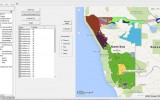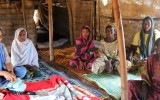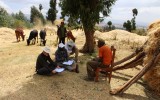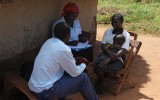Livelihoods
Showing items 16 to 30 of 42
View Categories
- Areas of expertise
- Capacity building
- Climate change
- Data
- Disasters and emergencies
- Famine prevention and food security
- Gender
- Income diversification
- Inequality
- Lake Victoria fisheries
- Livelihood resilience
- Livelihood Zones
- Livelihoods
- Monitoring and evaluation
- Nutrition and health
- Open source
- Policy and programme design
- Post-conflict
- Poverty research
- Refugees and displacement
- Social protection
- Technology
- Urban
- Vulnerability assessment
- Countries
- Hydromet
- Methods
- Resilience
- The organisation
-
New HEA software developed by Evidence for Development
The household economy approach (HEA) is a method for assessing the vulnerability of rural populations to economic shocks and changes, based on their livelihood patterns and market information. It is now widely used as a method of famine early warning by many governments and humanitarian agencies, and also has important applications for managing the impacts […]
-
Refugees’ livelihoods are important
Almost 15 years after the UN General Assembly proclaimed 18 December to be International Migrants Day (IMD), how has the occasion been received and observed, whose rights does it champion, and which groups does it currently exclude? Migrants and refugees: what’s the difference? In December 2000, two global days of observance related to migration were […]
-
Baseline assessment of Malian refugees in Burkina Faso, Part II: Qualitative social and economic study (2014)
No single research methodology can fully explain why some households prosper in new and challenging situations while others do not, and nor can a single method answer fundamental questions relating to the underlying drivers of change within communities. This report complements the baseline study of household economies of Malian refugees in Burkina Faso , providing additional social and contextual information from Sag Nioniogo, Goudebou and Mentao refugee camps to support programming decisions.
-
Livelihood baseline assessment of Malian refugees in Burkina Faso: Quantitative analysis of household economies (2014)
This assessment was undertaken on behalf of UNHCR to provide baseline information on the livelihoods of Malian refugees in Burkina Faso, to identify opportunities for greater economic self-reliance, and to highlight risks and vulnerabilities of specific groups within the population. This report covers the three official refugee camps in Burkina Faso: Sag Nioniogo, Goudebou and Mentao.
-
The Household Economy Approach: Managing the impact of climate change on poverty and food security in developing countries (2014)
Also available at: http://www.sciencedirect.com/science/article/pii/S221209631400031X
-
Aid impact assessment and agricultural change: Researching ‘good enough’ qualitative approaches
Using public money to reduce global poverty is a tough enough ‘task’ even without having to account for each pound spent every five minutes. But aid professionals can hardly claim to be less susceptible to self-serving group-think than anyone else, and indeed the case for strong reality checks on aid expenditure will remain particularly strong […]
-
Helping to rebuild communities in northern Uganda
You might remember all the attention last year on stopping Joseph Kony and the LRA. For the past two weeks I’ve been with Self Help Africa (SHA) in a region of northern Uganda that was severely affected by the conflict – in many villages, a whole generation of young adults are missing – and there […]
-
Improving smallholder farmers’ livelihoods through mango production and marketing project baseline IHM assessment, Salima, Malawi (2013)
The purpose of the baseline survey was to provide information that will assist in the monitoring and evaluation of Mango projects implemented by Self Help Africa (SHA) in partnership with ANAMARC in Salima District, Malawi. The study used the Individual Household Method (IHM) for data collection and data analysis and included four whole village surveys, randomly selected for the assessment.
-
Livelihood zoning and rural wealth rankings HEA baseline report, Mbala and Luwingu Districts, Zambia (2013)
This baseline livelihoods zoning and wealth ranking exercise examines the livelihood systems in Mbala and Luwingu districts, Northern Province of Zambia. The assessments describe how a livelihood functions during a normal year, thereby providing a base with which to compare and measure any new threats to the population’s food security, as well as to inform recovery and development programming and policy.



